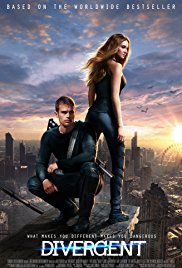
The young adult craze (“Twilight,” “The Hunger Games”) has recently crashed (“Beautiful Creatures,” “Vampire Academy,” “The Mortal Instruments: City of Bones”), and the media has decided that the fate of future young adult film adaptations will live and die on the box office returns of “Divergent.” This is patently unfair, of course; “The Hunger Games” sold 14 times as many books as “Vampire Academy,” so why should anyone expect anything less with their film adaptations? Answer: they shouldn’t, but somehow this is now “Divergent’s” problem. The good news is that “Divergent” should fare much better than the three ‘crashed’ movies. It’s intriguing, and asks valid questions about when we can reasonably expect a young adult to know who they truly are, and why we tend to punish people who prefer to think for themselves, but it has some issues as well, namely an absurd amount of exposition, a rigid story structure, and a lack of emotional impact.
Set in dystopian post-war Chicago at an undetermined time, all residents of the city are divided into five factions. Beatrice Prior (Shailene Woodley) is a member of the selfless Abnegation faction, but she faces a big decision in the next few days. As a 16-year-old, she, along with her brother Caleb (Ansel Elgort) and all other 16-year-olds, will choose whether to remain in their current faction or join a new one. Both Beatrice and her brother defect to other factions, with Caleb choosing Erudite (smart, fact-driven) and Beatrice choosing Dauntless (brave, fearless). As a “stiff” (a derogatory term for Abnegation), Beatrice has her work cut out for her, but she proves to be more resilient than most had expected, and a lot of that has to do with the results of her pre-ceremony exam, where she was found to be Divergent, meaning that she exhibited the qualities of more than one faction. Her examiner (Maggie Q) warns her against telling anyone that she was Divergent, and Beatrice (who rechristens herself Tris in Dauntless) quickly discovers why: the fluid (read: non-conformist) tendencies of Divergents have branded them as the enemy of Chicago’s faction world, and they are hunted and killed when exposed.
Shailene Woodley is about to suffer about a million unfavorable comparisons to Jennifer Lawrence’s work in the “Hunger Games” movies. Once again, this is patently unfair. Yes, Lawrence shows much more dramatic range than Woodley does here, but then again, we’re comparing a self-sufficient hunter-gatherer to a girl who’s only allowed to look in a mirror for a few seconds a year and has been instructed her whole life to put the everyone else’s needs ahead of her own. If she seems a little emotionally restrained, that would be why. Woodley actually does a fine job of capturing Tris’ quiet storm; the problem is that her character just isn’t as interesting as Katniss. Indeed, no one really leaps off of the screen in this movie, though Miles Teller, who played the charming Willard in the 2011 remake of “Footloose,” is unnervingly convincing as the psychotic alpha male initiate Peter.
There is a hell of a lot of talking in this movie. One woman explains the pre-ceremony exam. Then Kate Winslet (she’s Erudite leader Jeanine) explains the ceremony, among other things. Dauntless initiate trainer Four (Theo James) explains the stages of initiate training, and what it takes to survive them. Tris’ initiate friends from other factions provide valuable nuggets of information, presumably for her benefit but mostly for us. What they don’t explain is how Tris’ new friend Christina, the lovely Zoë Kravitz, was never in danger of being cut from Dauntless despite being nearly a head shorter than Tris and being even less physically imposing. They also don’t explain that this world is much, much tougher than it appears. Several of the harsh realities that Veronica Roth detailed in her book (one Dauntless initiate becomes homeless within minutes of joining, and another dies trying to pass the second test) are glossed over here, which is a mistake. This movie could use some teeth, and it’s surprising that they didn’t use the ones that the book provided them.
“Divergent” is the damnedest thing. Despite the fact that the premise is much more high-concept than those silly “Twilight” books, the first “Twilight” movie actually improves upon its source material, while “Divergent,” far superior in every way, does not. The ultimate irony is that the “Twilight” movies and “Divergent” were made by the same studio (Summit), and Summit is owned by Lionsgate, which makes the “Hunger Games” movies. If any two studios on the planet knows how to spin this stuff into gold, it’s Summit and Lionsgate, and even they couldn’t get this one right.
 (2.5 / 5)
(2.5 / 5)



